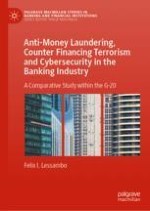Despite massive investments in mitigation capabilities, financial crime remains a trillion-dollar global issue with impacts that extend well beyond the financial services industry. Worldwide, there are between $800 billion and $2 trillion laundered annually with the United States making up at least $300 billion of that figure. Although it is not possible to measure money laundering in the same way as legitimate economic activity, the scale of the problem is considered enormous. The cybersecurity landscape is always shifting, with threats becoming more sophisticated all the time. Managing risks in the banking and financial sectors requires a thorough understanding of the evolving risks as well as the tools and practical techniques available to address them. Cybercrime is a global problem, which requires a coordinated international response. This book outlines the regulatory requirements that come out of cyber laws and showcases the comparison in dealing with AML/CFT and cybersecurity among the G-20, which will be of interest to scholars, students and policymakers within these fields.
